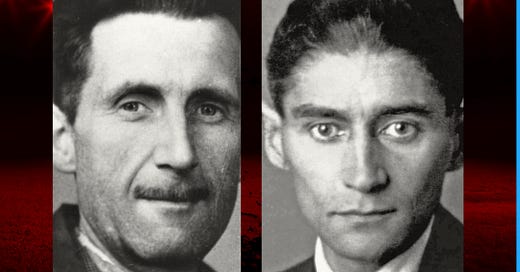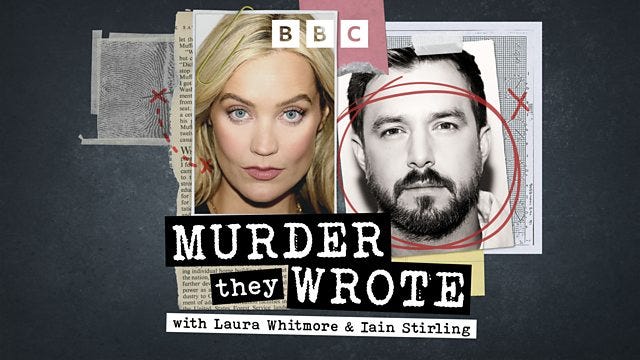Listen Up: Here's a Pair of Podcasts I've Been Enjoying
The BBC has been filling my ears and making me think and chuckle.
Podcasts, am I right? Aren’t you sick of them? I was. And that’s before I even listened to one.1
I now have a more nuanced take on the genre, which is that podcasts are basically like people: There are excellent ones and there are lousy ones. The vast majority are somewhere in the middle. You can live your life just fine without making their acquaintance. 2
But there are a couple that I’m glad I met, both courtesy of the BBC. If you’re like me, you may enjoy them, too.
I’ll start with the more “serious” one: “Orwell vs. Kafka,” an examination of two 20th century writers whose very names have become adjectives for dystopia. What do we mean when we describe a situation as “Orwellian”? And should we have said “Kafkaesque” instead?
Sharp-eyed readers will notice I put “serious” in quotation marks above. That’s because the six-part series is quite funny at times, in a black humor sort of way. Its hosts are Ian Hislop, editor of Private Eye magazine3, and Helen Lewis, a Private Eye contributor who also writes for The Atlantic. They’re both smarty-pants Oxford grads, but try not to hold that against them. If there’s one thing an elite English education gives you, it’s the ability to riff, to banter, to make connections between the academy and the High Street.
And it’s not just the two of them talking at each other. They interview experts in Kafka and Orwell, who, like the best college professors, are able to speak engagingly and enthusiastically about their subjects, even to a lay audience. They explore the ways George and Franz were similar, the ways they were different. They examine the milieus from which each arose and the reaction to their work, then and now.
It’s a mash-up of biography, psychology, history, culture and literary criticism in episodes that are a tidy 28 minutes each. Listening to “Orwell vs. Kafka” is like shooting the shit with some smart friends.
Who wins in the end? The tubercular Czech or the tubercular Brit? “1984” or “The Trial”? Let’s just say that these days are so dystopian that we need both the adjectives these writers gave us.
The other podcast couldn’t be more different. I just now looked up some reviews of it and it seems that plenty of people hate it. Whether you do might depend on how seriously you take your true crime.
“Murder They Wrote” features young wife-and-husband duo Laura Whitmore and Iain Stirling discussing historic crimes, usually murders but occasionally heists. Who are Laura Whitmore and Iain Stirling? I have no idea.
Or I had no idea before I started listening to their podcast. Whitmore is an Irish TV presenter and model who hosted “Love Island” in the UK. Stirling is a Scottish comedian. They claim to love true crime but I suspect some podcast producer just heard them yapping at each other and said, “You guys are so goshdurn delightful. Let’s stick you in your closet with a microphone and some hastily-assembled research materials and let you channel Nick and Nora.”
I confess that I’m a sucker for accents and I just get a kick out of hearing them both speak: her in an Irish brogue, him in a Scottish burr. Stirling tries to adopt other accents, too — depending on where the event took place — and his American accent is so bad it should probably be the subject of a future true crime podcast.
Most of the crimes were obscure to me: the newlywed wife pushed off a cliff by her German husband; the English philanderer who figured out a foolproof way to drown his wives. Some weren’t quite so gruesome. The story of the 2011 theft from Canada’s strategic maple syrup reserves is very amusing. It’s sticky, but no one comes to a sticky end.
The pair trade-off in leading each episode, one describing the circumstances to the other, both conjecturing on motive and modus operandi and critiquing the investigators.
They cover some well-known cases — the Patty Hearst kidnapping; the Brink’s-Mat robbery; the Manson family murders — but you have to wonder why. The research sounds like it doesn’t extend past a few Wikipedia pages and a book or two. This isn’t “Serial.”
What I like about “Murder They Wrote” is the gentle needling Whitmore and Stirling administer to other and the glimpses they give us into their lives and their life together: their dog, their parents.
I like spending time with Iain and Laura. And if one day one should murder the other, they’ve provided plenty of audio for a killer podcast.
Pod people
I listened to these podcasts on the BBC app. (I even shell out $4.99 for a monthly subscription.) But you should be able to find them online and on streamers like Spotify.
Any podcasts you recommend?
Other things I instantly became sick of hearing about: cryptocurrency, 3-D printing and pickleball.
My real problem with podcasts is the conventions that have become embedded in the genre: the deliberate showing of the work, with the sounds of ringing telephones, interview subjects spelling their names, the background noise of coughing and throat-clearing. There’s a studied amateurishness to even the most “professional” of podcasts. I guess I blame public radio’s Radiolab, which seems to have started it all.
This is the second time I’ve mentioned Private Eye. (See my first post from Aug. 1.) It’s an amazing publication, a mixture of SPY, “60 Minutes” and Mad magazine. The front of the book is gossipy coverage of media and politics; the center is satirical, topical humor (often sophomoric); the back is investigative journalism. There are also snippy book reviews. Nothing is bylined. Much of it seems actionable. I’m amazed that it even exists.






Good stuff